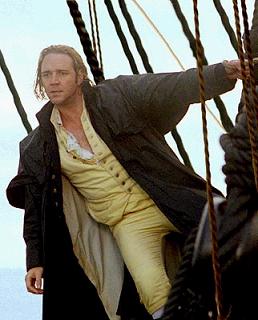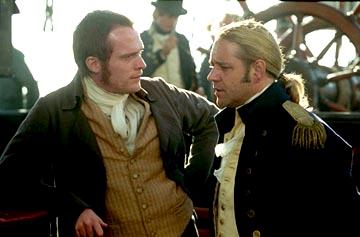

Master and Commander: The Far Side of the World finally brings to life the characters of Captain Jack Aubrey and Dr. Stephen Maturin, forever immortalized in the novels of Patrick O'Brian. There are twenty Aubrey/Maturin novels, and a rabid, fanatical fan base that loves O'Brian's detailed and intricate appreciation for historical accuracy. The film takes its name from the first novel (Master and Commander) and much of the plot from the tenth novel (The Far Side of the World), hence its overly long and undescriptive title. Nevertheless, the movie retains O'Brian's attention for detail, and creates a suspenseful voyage that begins off the coast of Brazil, travels around South America, and north to the Galapagos Islands. It is basically one long chase movie, with the crew of the HMS Surprise playing a cat and mouse game with the French ship (in the book she's American) Acheron, a stronger, more powerful ship with a larger crew.
Aubrey (Russell Crowe, A Beautiful Mind, Proof of Life), known to his crew as "Lucky Jack," is a commanding figure. His crew trusts him with their lives. He is a more than able sailor, tough as nails and worthy of respect. This contrasts with Maturin (Paul Bettany, The Heart of Me, A Beautiful Mind), the ship's doctor. Maturin is gentle, compassionate, thoughtful, and above all, an intellectual. It is an unlikely friendship built on respect, as well as many nights playing the violin and cello. Above all, Aubrey can rely on Maturin for some honest and independent advice, which is in dire need here. At the beginning of Master and Commander, Aubrey receives orders to intercept the Acheron. The film takes place during the Napoleonic Wars, and dominance at sea is essential. The Archeron seemingly appears out of nowhere, and beats the pants off the Surprise.
Pride is a large element of Aubrey's character. Instead of turning back for repairs, Aubrey decides to go after the Archeron. It looks like a losing battle, and Maturin opposes the idea. Master and Commander is a whole lot of nothing bookended by two impressive naval battles. To some, the entire middle section may be boring, but in actuality, it is necessary in order to make the finale more climactic. Director Peter Weir (The Truman Show, Fearless) adapted the film with John Collee (Paper Mask) spend this time seeped in details and marching inevitably towards the showdown. It just feels real. There is little land, and nothing to do except repair the ship and prepare for battle. Weir films the Surprise so that it looks dingy, cramped, and dank. Men brush past each other going back and forth in the bowels of the ship, and the wood and ropes creak ominously.
Crowe is always an imposing presence, and a good choice for a role like Aubrey. He seems to radiate strength, and it's easy to see why his crew believes so much in him. Unfortunately, the rest of the crew sinks into anonymity, like the red-shirted crewmembers on an old Star Trek episode. Oh, there is the really young kid with no arm, the old guy with white hair, the guy everybody hates, and some other people, but Crowe and Bettany feel like the only characters with any depth to them. In the end, what is important is that each man has his specific role to perform in order to make the Surprise seaworthy. But all this is okay once the battles begin. They are thrilling affairs told almost completely from the English perspective. For most of the film, the Archeron is a ship in the distance, and even as the film nears its conclusion, they are rarely on screen. He shoots the film intimately, so the action is right up against the screen. Earlier, one could hear every creak in the ship, now, every explosion and battle between the two is thunderous. The viewer feels like he/she is part of the battle.
Equally impressive is that Master and Commander can stay interesting without one female character. Okay, there is one, but she has no lines and is probably on screen for a few seconds. Nearly the entire movie takes place on the ocean (filmed in the same tank off Mexico as Titanic), yet it never becomes dull, even with its long running time. Master and Commander also has what is missing from many films today: a sense of adventure. It is an old-fashioned swashbuckling tale with a sense of honor and duty that seems out of place in today's world, but fits perfectly within the confines of this film. There are eighteen books left to film. Let's get started.